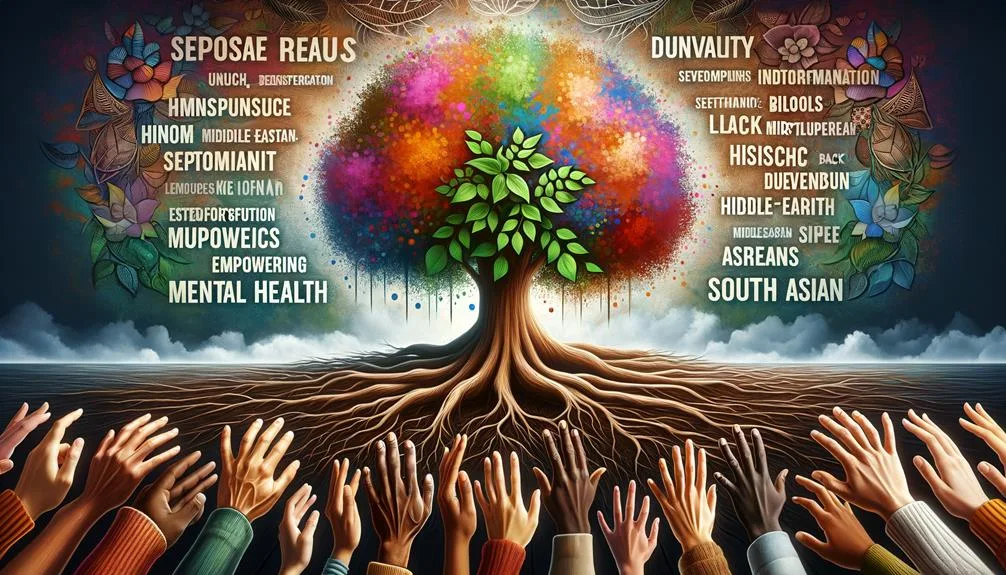Are you searching for a source of inspiration and motivation to enhance your mental well-being? Look no further as we explore a collection of empowering mental health quotes that possess the potential to bring about transformative change in your life.
These quotes, carefully crafted by renowned authors and mental health advocates, offer deep insights into the significance of mental health and its profound impact on our overall state of being. They serve as a beacon of hope, reminding us that even during our darkest moments, there exists a glimmer of light.
By embracing these empowering words and incorporating them into our daily lives, we can foster resilience, practice self-care, and cultivate a positive mindset. Whether you are personally grappling with mental health challenges or seeking inspiration to support others, these quotes will serve as a guiding force on your journey towards mental wellness.
Key Takeaways
- Quotes have the power to inspire and empower individuals struggling with mental health issues.
- Mental health is as important as physical health and should be prioritized for overall well-being.
- Society must work towards reducing the stigma surrounding mental illness to create a supportive environment.
- Recognizing the strengths and inner resilience of individuals is crucial for promoting mental health and well-being.
Quotes to Inspire Hope and Resilience
If you're feeling overwhelmed and in need of some encouragement, these quotes on hope and resilience can provide the inspiration you're seeking. Overcoming adversity is a challenging journey, but it's possible to find strength and hope amidst the difficulties.
Promoting self-care is essential in nurturing your resilience and maintaining your mental well-being. As you navigate through life's challenges, remember the words of John Green: 'There is hope, even when your brain tells you there isn't.' Shannon L. Alder reminds us to focus on the present moment, saying, 'The true definition of mental illness is when the majority of your time is spent in the past or future, but rarely living in the realism of NOW.'
Elyn R. Saks emphasizes the importance of recognizing that mental illness doesn't define a person's wholeness, stating, 'No one would ever say that someone with a broken arm or leg is less than a whole person, but people say that or imply that all the time about people with mental illness.' Nitya Prakash reminds us to be mindful of our words and actions towards those with mental illness, urging us not to ignore or fight it, but to support and understand.
Challenging Stigma and Misconceptions

Challenging the stigma and misconceptions surrounding mental health is crucial for fostering understanding and empathy in society. By challenging societal perceptions, we can promote acceptance and understanding, creating a more inclusive and supportive environment for those struggling with mental health issues.
Here are two important points to consider:
- Education and Awareness:
- Promote education about mental health to dispel myths and misconceptions.
- Increase awareness of the prevalence and diversity of mental health conditions.
- Empathy and Compassion:
- Encourage open conversations about mental health to reduce stigma and discrimination.
- Foster empathy and compassion by listening without judgment and offering support.
Language and Assumptions in Mental Health

Language and assumptions play a critical role in shaping our understanding and support of mental health. The language we use to talk about mental health can either promote or hinder recovery. Changing our assumptions can lead to more positive outcomes in mental health. It is important to recognize that the words we choose have power and can influence how individuals with mental health challenges are perceived and supported. To illustrate this, let's consider the following table:
| Language to Avoid | Language to Use |
|---|---|
| "Crazy" | "Experiencing distress" |
| "Weak" | "Resilient" |
| "Crazy person" | "Person with mental health challenges" |
| "Mental illness" | "Mental health condition" |
| "Unstable" | "Managing fluctuating emotions" |
Understanding the Experience of Mental Illness

Understanding the experience of mental illness can be a transformative journey of empathy, knowledge, and insight. It's important to recognize that mental illness doesn't define a person's identity. It's just one aspect of their overall well-being.
Unfortunately, negative perceptions of mental illness contribute to stigma and a lack of understanding. By educating ourselves and challenging these perceptions, we can create a more supportive and accepting society.
It's crucial to understand how it feels to someone living with mental illness in order to have meaningful conversations and provide effective support. By breaking down the barriers of stigma and increasing education, we can create a world where mental health is treated with the same importance as physical health.
Strategies for Empowering Mental Health Support

To support and empower individuals with mental health challenges, it is essential to implement effective strategies that promote understanding, empathy, and access to resources. Empowering mental health initiatives and promoting mental health awareness can make a significant difference in the lives of those struggling with mental health issues. Here are three key strategies that can help empower mental health support:
| Strategies | Description |
|---|---|
| Education and Awareness Campaigns | Launching educational campaigns to increase mental health literacy and raise awareness about the importance of mental well-being. |
| Accessible Mental Health Resources | Ensuring that individuals have easy access to mental health resources such as therapy, support groups, helplines, and online resources. |
| Peer Support and Community Engagement | Encouraging the establishment of peer support programs and promoting community engagement to create a network of understanding and support. |
Frequently Asked Questions
How Can Empowering Mental Health Quotes Inspire Hope and Resilience in Individuals?
Empowering mental health quotes can inspire hope and resilience in you by providing a sense of comfort and perspective. These quotes remind you that you are not alone and that there is strength within you to overcome challenges.
What Are Some Common Misconceptions and Stigmas Surrounding Mental Health That Need to Be Challenged?
What misconceptions and stigmas surround mental health? Are people with mental illness weak or dangerous? Challenging these beliefs is crucial. Mental health is complex, and understanding promotes empathy, support, and positive change in society.
How Can Language and Assumptions Impact the Support and Treatment of Individuals With Mental Health Issues?
Language and assumptions play a crucial role in supporting individuals with mental health issues. The impact of language can either promote or hinder their treatment and support. Assumptions can shape our perception and understanding of their experiences, so it's important to be mindful and empathetic.
What Is the Experience of Mental Illness Like for Individuals, and How Can It Be Understood and Empathized With?
Experiencing mental illness can be challenging, but building empathy can help. Understand that mental illness is unique to each individual. Listen non-judgmentally, educate yourself, and offer support. Together, we can create a compassionate and understanding society.
What Strategies Can Be Implemented to Empower and Support Mental Health in Individuals?
To empower and support mental health, it's important to implement strategies that prioritize individual well-being. By providing resources and education, promoting awareness, and fostering a supportive environment, we can help individuals on their journey to mental health and happiness.
Conclusion
In conclusion, these empowering mental health quotes have the power to transform lives by providing hope, resilience, and a positive mindset. They challenge stigma and misconceptions surrounding mental health while promoting understanding and empathy.
By incorporating these quotes into our daily lives, we can cultivate self-care and support others on their journey towards mental wellness. Although some may argue that quotes alone can't solve mental health challenges, they serve as a guiding light and reminder that change is possible.

